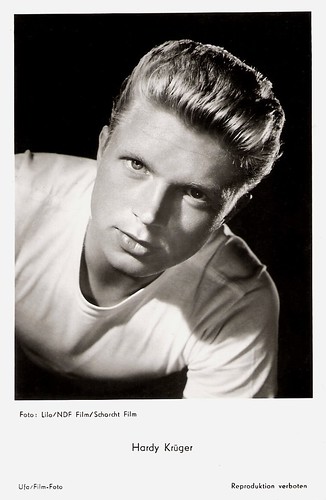
German postcard by Ufa Film-Foto, Berlin-Tempelhof, no. FK 1182. Photo: Lilo / NDF Film / Schorcht Film. Publicity still for Muss man sich gleich scheiden lassen?/Does one have to get divorced right away? (Hans Schweikart, 1953).
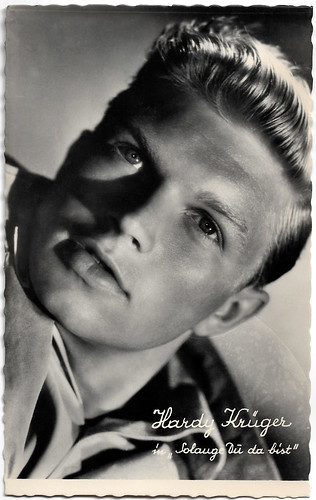
Austrian postcard by Verlag Hubmann, Wien, no. 2948. Photo: Hardy Krüger in Solange du da bist/As Long as You're Near Me (Harald Braun, 1953).
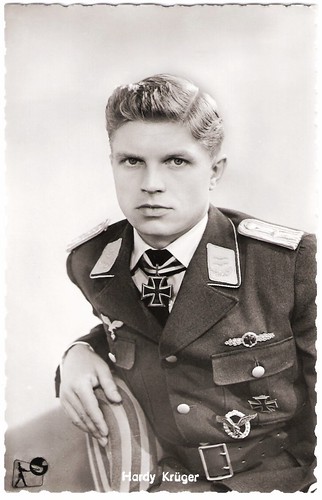
German postcard by Kolibri-Verlag G.m.b.H., Minden/Westf., no. 2727. Photo: Rank / Seeliger. Still for The One That Got Away (Roy Ward Baker, 1957).
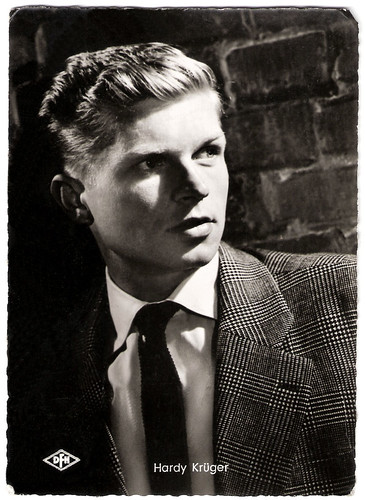
German postcard, no. 1251. Photo: Wesel / Berolina Film / Deutsche Film Hansa. Publicity still for Banktresor 713/Bank Vault 713 (Werner Klingler, 1957).

British postcard by East-West Publishers.
Young eagle
Franz Eberhard August Krüger was born in 1928 in Berlin. He was the son of engineer Max Krüger.
From 1941 on, Hardy attended the Adolf-Hitler-Schule at Burg Sonthofen, an elite Nazi boarding school. Here the blonde and handsome 15-year-old was cast for the film Junge Adler/Young Eagles (Alfred Weidenmann, 1944) starring Willy Fritsch. This propaganda film for the Wehrmacht was filmed in the huge Ufa studio in Babelsberg.
After his successful performance as the apprentice Bäumchen, director Wolfgang Liebeneiner tried to persuade him to continue his film career. In March 1945 the young Krüger was drafted into the SS Division 'Nibelungen', where he was drawn into heavy fighting before being captured by US forces in Tirol.
After his release, he began to write but did not publish. Instead, he started to perform in German theatres.
In 1949, he made his first post-war film, the comedy Diese Nacht vergess Ich nie/I'll Never Forget That Night (Johannes Meyer, 1949), with Gustav Fröhlich and Winnie Markus. In the following years, his film career took off.
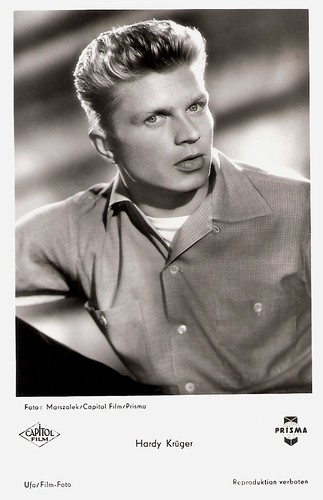
German postcard by Ufa Film-Foto, Berlin-Tempelhof, no. FK 1659. Photo: Marszalek / Capitol Film / Prisma.
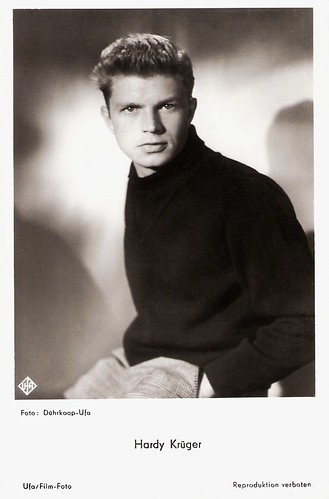
German postcard by Ufa Film-Foto, Berlin-Tempelhof, no. FK 3057. Photo: Dührkoop / Ufa.
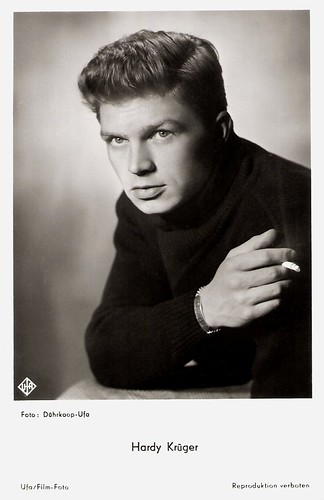
German postcard by Ufa Film-Foto, Berlin-Tempelhof, no. FK 3058. Photo: Dührkoop / Ufa.
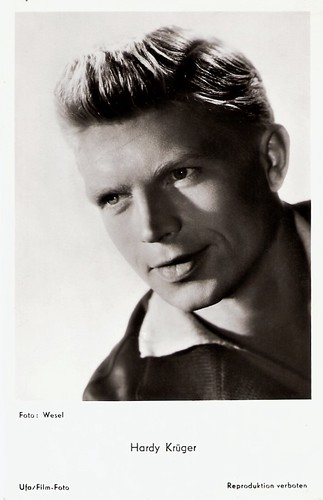
German postcard by Ufa Film-Foto, Berlin-Tempelhof, no. FK 3622. Photo: Wesel.
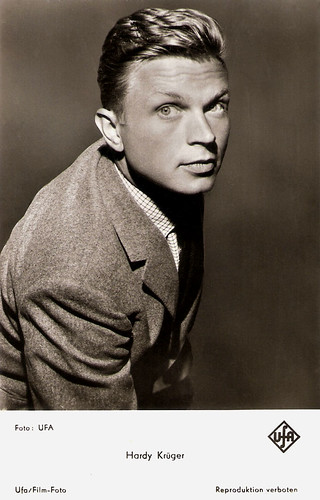
German postcard by Ufa, Berlin-Tempelhof, no. FK 4615. Photo: Ufa.
Effortlessly natural attitude
Hardy Krüger became known as a handsome young man with an effortlessly natural attitude in Illusion in Moll/Illusion in a Minor Key (Rudolf Jugert, 1952) starring Hildegard Knef.
Next, he appeared in the drama Solange Du da bist/As Long as You're Near Me (Harald Braun, 1953) with O.W. Fischer, and the comedy Die Jungfrau auf dem Dach/The Girl on the Roof (Otto Preminger, 1953) with Johannes Heesters.
The latter was the German version of the Hollywood production The Moon is Blue (Otto Preminger, 1953) starring William Holden and Maggie McNamara. Hardy Krüger and co-star Johanna Matz also appeared uncredited as tourists at the Empire State Building sequence in the American version.
The quality of some of Hardy Krüger's next films in West Germany did not match his talents.
Although the jungle fantasy Liane, das Mädchen aus dem Urwald/Liane, Jungle Goddess (Eduard von Borsody, 1956) with a briefly topless Marion Michael was one of the biggest German box office hits of the 1950s, he declined to star in further Liane films for 'artistic reasons'.
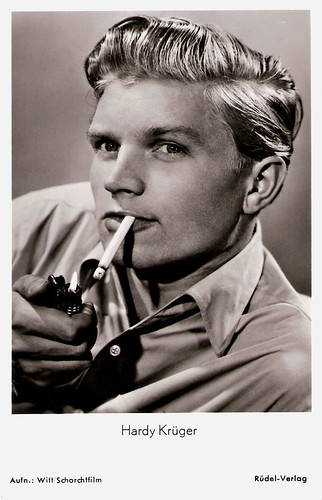
German postcard by Rüdel-Verlag, Hamburg-Bergedorf, no. 403. Photo: Witt / Schorchtfilm. Publicity still for Ich heisse Niki/My Name is Nicky (Rudolf Jugert, 1952).
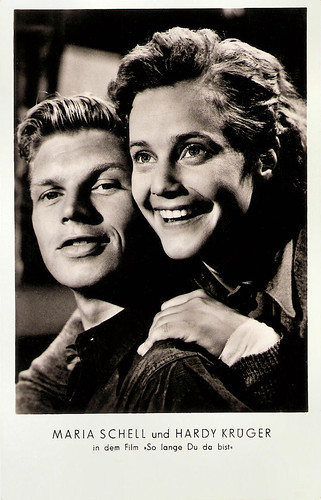
East-German postcard by Reichenbach, no. 691/56. Photo: NDF / Schorchtfilm. Publicity still for So lange Du da bist/As Long as You're Near Me (Harald Braun, 1953) with Maria Schell.

West-German postcard by Kolibri-Verlag, no. 1075. Photo: NDF / Schorchtfilm / Lilo. Hardy Krüger in Der letzte Sommer/The Last Summer (Harald Braun, 1954).

Dutch postcard by Uitgeverij Takken, Utrecht, no. 3791. Photo: NV Standaardfilms. Marion Michael and Hardy Krüger in Liane, das Mädchen aus dem Urwald/Liane, Jungle Goddess (Eduard von Borsody, 1956).
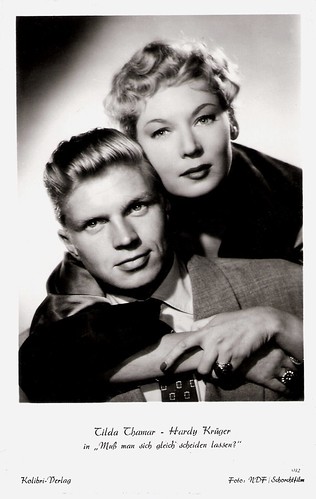
German postcard by Kolibri-Verlag, no. 912. Photo: NDF / Schorchtfilm. Publicity still for Muss man sich gleich scheiden lassen?/Does one have to get divorced right away? (Hans Schweikart, 1953) with Tilda Thamar.
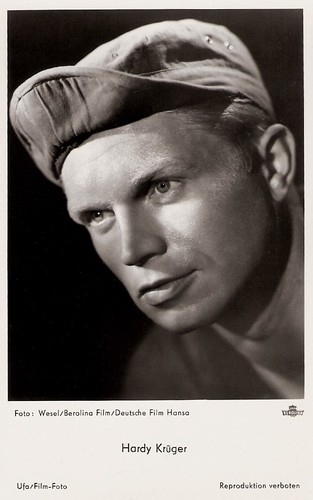
German postcard by Ufa Film-Foto, Berlin-Tempelhof, no. FK 3743. Photo: Wesel / Berolina Film / Deutsche Film Hansa. Publicity still for Banktresor 713/Bank Vault 713 (Werner Klingler, 1957)
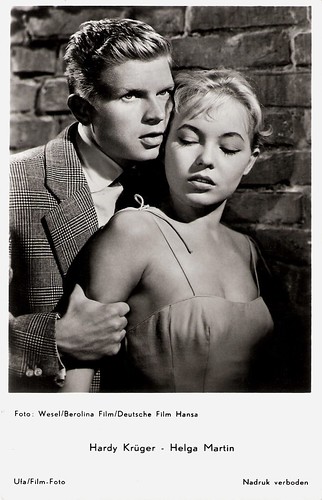
Dutch postcard by Gebr. Spanjersberg N.V., Rotterdam, no. 3747. Photo: Wesel / Berolina Film / Deutsche Film Hansa. Publicity still for Banktresor 713/Bank Vault 713 (Werner Klingler, 1957) with Helga Martin.
Soldiers and adventurers
Hardy Krüger was fluent in English, French, and German, and found himself in demand by British, French, American, and German producers.
J. Arthur Rank cast him in three British pictures practically filmed back-to-back. The first one was The One That Got Away (Roy Ward Baker, 1957), the story of the positive and unpolitical lieutenant Franz von Werra, the only German prisoner of war to successfully escape from numerous British POW camps during the Second World War and return to Germany.
The second was the comedy Bachelor of Hearts (Wolf Rilla, 1958), and the third was the thriller Blind Date (Joseph Losey, 1959) with Stanley Baker and Micheline Presle. In reviews, Hardy was described as 'ruggedly handsome' and a 'blond heartthrob'.
Despite anti-German sentiment still prevailing in postwar Europe, he became an international favourite. He appeared in the German Shakespeare update Der Rest ist Schweigen/The Rest Is Silence (Helmut Käutner, 1959), and in the French WW II adventure Un taxi pour Tobrouk/Taxi for Tobruk (Denys de La Patellière, 1960).
A highlight was the French drama Les dimanches de Ville d'Avray/Sundays and Cybele (Serge Bourguignon, 1962). This hauntingly beautiful film about a platonic relationship between a former bomber pilot with war trauma and amnesia, and a 12-year-old orphan girl (Patricia Gozzi), was awarded the 1962 Best Foreign Film Academy Award. It paved Krüger's way to Hollywood.
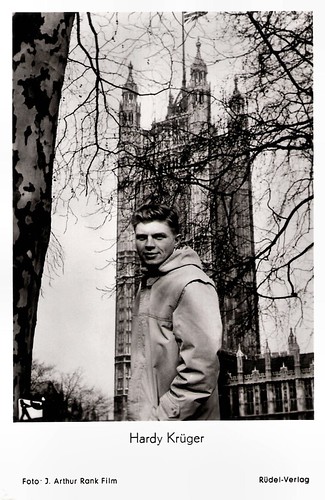
German postcard by Rüdel-Verlag, no. 2134. Photo: J. Arthur Rank Film. Publicity still for The One That Got Away (Roy Ward Baker, 1957).
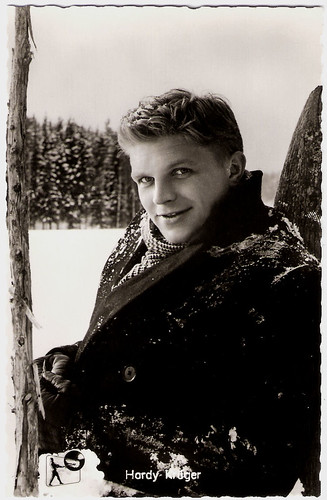
German postcard by Kolibri-Verlag, no. 2799. Photo: J. Arthur Rank Film. Publicity still for The One That Got Away (Roy Ward Baker, 1957).
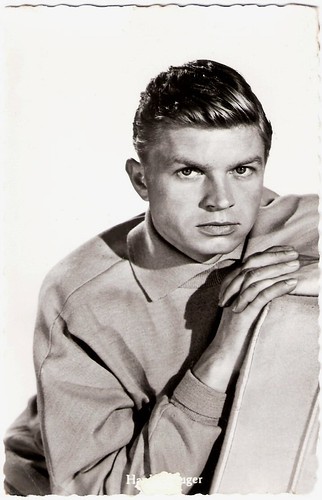
Dutch postcard by NV v.h. Weenenk & Snel, Baarn, no. 759. Photo: Rank Film for The One That Got Away (1957).
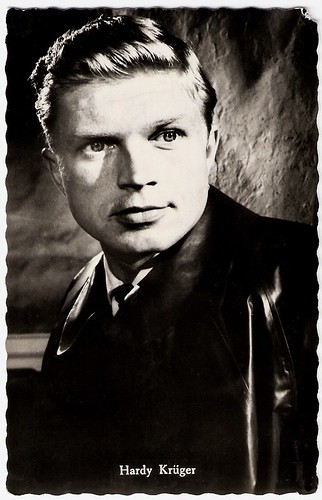
German postcard by Kolibri-Verlag G.m.b.H., Minden/Westf., no. 783. Photo: Rank. Still for Bachelor of Hearts (Wolf Rilla, 1958).
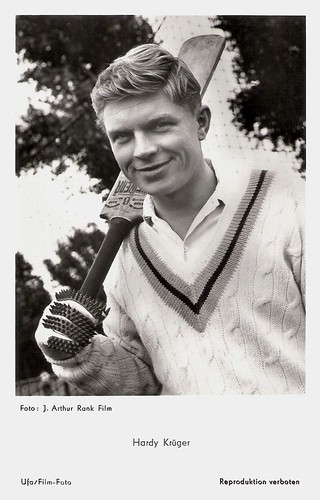
German postcard by Ufa, Berlin-Tempelhof, no. FK 4334. Photo: J. Arthur Rank Film. Publicity still for Bachelor of Hearts (Wolf Rilla, 1958).
Hollywood
In the USA, Hardy Krüger started in the African adventure Hatari! (Howard Hawks, 1962), at the side of John Wayne and Elsa Martinelli.
His later films included Hollywood productions like the original version of The Flight of the Phoenix (Robert Aldrich, 1965) about the survivors of a plane crash in the middle of the Sahara desert, and the war comedy-drama The Secret of Santa Vittoria (Stanley Kramer, 1969) with Anthony Quinn and Anna Magnani.
In the star-studded war epic A Bridge Too Far (Richard Attenborough, 1977), he portrayed a Nazi General. Hardy Krüger related during the shooting how he hated to wear a Nazi uniform. Between takes, he wore a topcoat over his SS uniform so as "not to remind myself of my childhood in Germany during WW II." Although he often played German soldiers, his characters were mostly positive, he personified the 'good German'.
Krüger also appeared in many European productions like Le Chant du monde/Song of the World (Marcel Camus, 1965) with Catherine Deneuve, the controversial box office hit La Monaca di Monza/The Nun of Monza (Eriprando Visconti, 1969) about a 17th-century Italian nun's long-repressed sexual passion, the Italian-Russian coproduction Krasnaya palatka/The Red Tent (Mikhail Kalatozov, 1969) starring Sean Connery, and the murder mystery À chacun son enfer/To Each His Hell (André Cayatte, 1977) with Annie Girardot.
During that period, he made his sole appearance in a film of the New German Cinema in Peter Schamoni's Western comedy Potato Fritz/Montana Trap (Peter Schamoni, 1976). His most memorable role is the Prussian Captain Potzdorf in the Oscar winner Barry Lyndon (Stanley Kubrick, 1975) featuring Ryan O'Neal. His last film appearance was in the Swedish-British thriller Slagskämpen/The Inside Man (Tom Clegg, 1984) starring Dennis Hopper.
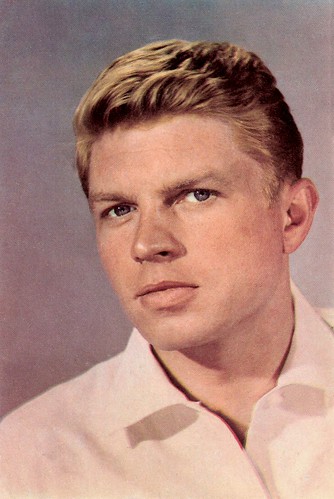
Belgian card by Cox, no. 35.

East-German postcard by VEB Progress Filmvertrieb. Starfoto, no. 1467. Photo: Hardy Krüger in the German-British film Alles spricht gegen van Rooyen/Blind Date (Joseph Losey, 1959).
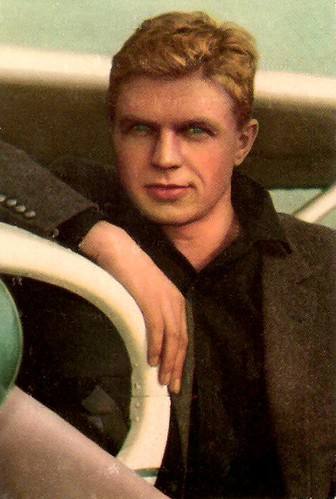
Belgian collector's card, no. 93.
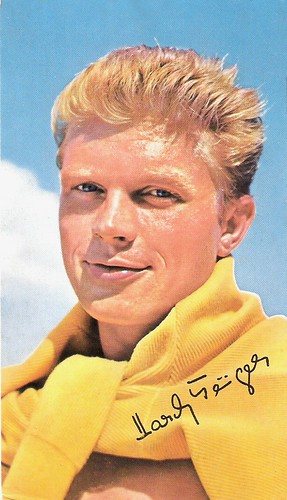
German collector's card by Luxor.
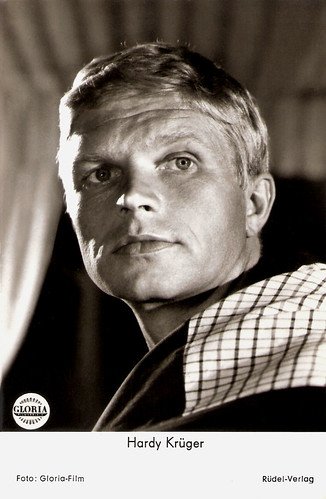
German postcard by Rüdel-Verlag, Hamburg, no. 4552. Photo: Gloria Film. Publicity still for Los pianos mecánicos/The Uninhibited (Juan Antonio Bardem, 1965).
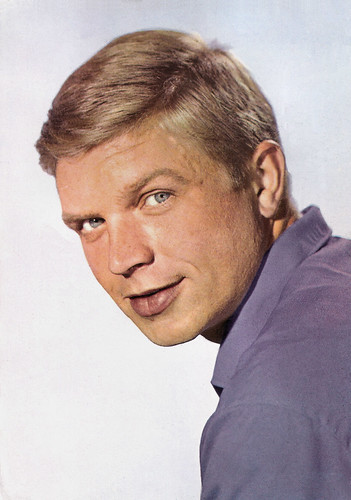
Spanish postcard by Postal Oscarcolor, no. 156.
A globe-trotter for TV
In the 1970s Hardy Krüger had taken up writing fiction and non-fiction, and he started a new career as a globe-trotter for TV. In 1983, after several novels, story collections, and a children's book he published the novel 'Junge Unrast' (Young Restlessness), an only slightly disguised autobiographic account of his life.
On television, he played the role of Field Marshal Erwin Rommel in the popular American TV series War and Remembrance (Dan Curtis, 1989) starring Robert Mitchum. In 2011 appeared as the pater familias in the TV film Die Familie/The Family (Carlo Rola, 2011) with Gila von Weitershausen as his wife.
Hardy Krüger married three times. His marriages with actress Renate Densow and Italian painter Francesca Marazzi ended in a divorce. He married his third wife, the American Anita Park, in 1978. He had three children. His daughter with Renate Densow, Christiane Krüger (born in 1945, when he was only 17), and his son with Francesca Marazzi, Hardy Krüger Jr. are both actors too.
Hardy Krüger was awarded many times for his work. In 2001 he was made Officier de la Légion d’Honneur in France, and in 2009, Germany honoured him with the Großes Verdienstkreuz (Great Cross of Merit). Hardy and Anita Krüger lived in California and in Hamburg.
Hardy Krüger died at his home in Palm Springs, California, on 19 January 2022, at the age of 93.
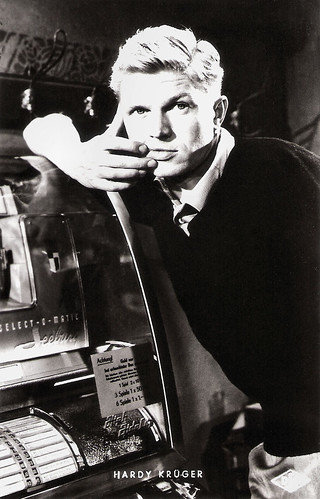
West-German postcard by Netter's Star Verlag, Berlin, no. 1256.

West-German postcard by Kunst und Bild, Berlin-Charlottenburg, no. V 139. Marion Michael and Hardy Krüger.
Hardy Krüger sings I'm A Lonely Man. From the film Blind Date (1959). Source: Rudi Polt (YouTube).
Trailer for Hatari (1962). Source: Paramount Movies Digital (YouTube).
Trailer for Barry Lyndon (1975). Source: Warner Bros (YouTube).
Sources: Hal Erickson (AllMovie - Page is now defunct), Stephanie D'heil (Steffi-line - German), Tom Hernandez (IMDb), Filmportal, Wikipedia, and IMDb.
This post was last updated on 29 January 2025.
2 comments:
Absolutely loved him in Hatari, The Flight of the Phoenix and more. He had a very interesting acting quality--and of course, he was extraordinarily handsome.
Thanks, we agree.
Post a Comment